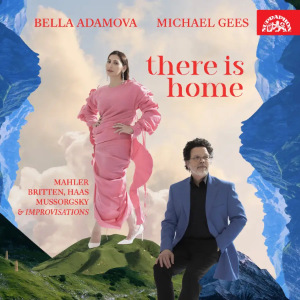
There is home
Pavel Haas (1899-1944)
Four Songs on Chinese Poetry
Gustav Mahler (1860-1911)
Rückert-Lieder
Modest Petrovich Mussorgsky (1839-1881)
The Nursery (selection)
Benjamin Britten (1913-1976)
Folksong Arrangements (selection) & Improvisations
Bella Adamova (contralto)
Michael Gees (piano)
rec. 2023, Martinů Hall, Academy of Performing Arts, Prague, Czech Republic
Supraphon SU4329-2 [73]
As Bella Adamova herself explains, this recital is an exploration of personal reflections on the meaning of ‘home’. What exactly does the word mean and if asked how do people answer where their home is? She poses the question as to whether it is where you were born or where you were raised or where you live. For some it may be all the same but in her case it certainly is not. Born in Chechnya but raised in Prague while using Russian to converse with her mother because she never learned Chechen sufficiently well to use it to communicate with people. It is therefore understandable that she feels somewhat in limbo in terms of where ‘home’ is for her, particularly when you add in the time she spent in London as a student, leading to her feeling the most confident in language terms speaking English. She also spends a lot of time professionally in Germany. She says, however, that she feels the most truly ‘at home’ in her songs and improvisations. It is significant, therefore that among other songs she chose to use in this recital, is the cycle of four songs on Chinese Poetry composed by Pavel Haas. Haas was a prodigiously gifted composer and one of that tragic generation of Jewish artists who ended their days in nazi captivity, in Haas’s case in Auschwitz though, before he was sent there, he spent time in the Terezín where he composed a great deal, including these four songs which, for him were a kind of refuge from the appalling conditions he and all the other inmates suffered. He was only one of several brilliant composers who spent time in this transit camp before being dispatched to their deaths in Auschwitz, the others included Gideon Klein, Viktor Ullmann and Hans Krasà, all of whom found solace in composing and whose music was mercifully somehow saved so that we are lucky enough to be able to enjoy it today.
Haas’s song cycle is wonderfully expressive, the final one Far is my home, o moon perhaps reveals how Haas was unable to put the thought of home from his mind with the last verse reading:
Oh sleep, give me a dream,
give me a dream of going back home,
Returning to my home, my home!
Sleep, you can give me no dream – my yearning keeps me awake.
It is almost unbearable to think of a truly great artist being made to suffer as he and all around him did, martyred on the altar of such an ideology of hate.
The second song is said to be an improvisation as is the seventh, tenth, fourteenth, seventeenth and nineteenth. To what extent they are improvisations I cannot determine since I don’t know the poems, some by writers unknown to me but they are beautifully sung as is every one on the disc, Bella Adamova has an amazingly impressive voice that explores each word and a diction that allowed me to find where in any line she was even when singing in Czech or Russian, despite my knowledge of each being rudimentary.
The songs by Mussorgsky are particularly enjoyable; Russian is such an expressive language and anyone who can make Czech sound soft, which she manages to do, is to be admired for it is generally a hard and somewhat guttural language just as is German though Bella sings Mahler’s Rückert-Lieder in such a way as to soften the hard edges. Her selection of Britten’s songs reveals an interesting facet, namely that some words are clearly more difficult to achieve an absolutely correctly pronunciation of. I do not say this to sound ‘picky’ but simply to point out how hard it is getting English to sound native. Bella had no difficulties with Britten’s Early one morning with every word perfectly pronounced while some words in her improvisation of Pablo Neruda’s The Queen prove to be tricky. This did not detract from a superb recital of art songs, all of which perfectly suited her crystal-clear voice. She is an obvious name to watch and her accompanist Michael Gees is a beautifully measured and entirely sympathetic partner.
Steve Arloff
Help us financially by purchasing from




















